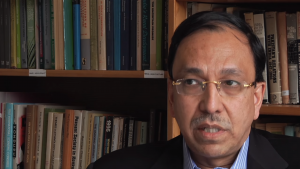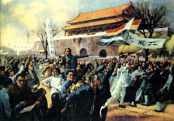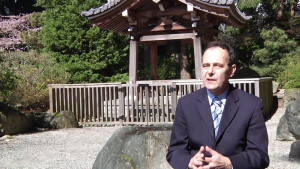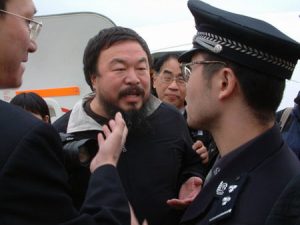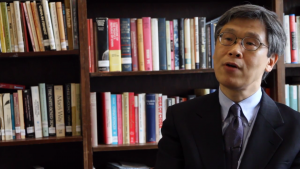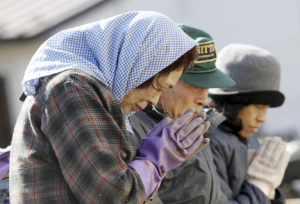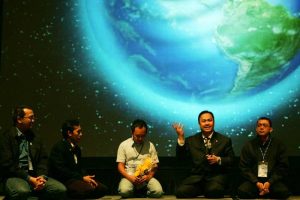Missionaries Infiltrating North Korea: How Long Can the Hermit Kingdom Avoid Reform?
Memo #77 – On April 11, 2011, the US State Department confirmed North Korea’s intention to prosecute an American, Jun Young-su, held since November 2010 for proselytizing. Another American missionary, Aijalon Gomes, was prosecuted and released in August 2010, following the February 2010 release of missionary Robert Park. A fascinating juxtaposition emerges: while more than one thousand North Koreans risk their lives to escape the hermit kingdom each year, outsiders risk severe punishment to enter the country to preach Christianity, with little evidence that missionaries in general receive leniency.
China’s Next Revolution: Fracking in the East
Memo #76 – Will Sichuan’s landscape one day resemble northeastern British Columbia’s Horn River Basin, one of North America’s most promising shale gas plays? The least contentious answer is ‘it won’t anytime soon,’ but there are many who would like to think so, especially in China. With the socialist revolution under their belt, Beijing is taking on another one – the shale gas revolution of North America. What the shale gas revolution lacks in cadres, it makes up in energy; coincidentally, the type most favoured by Beijing – the potential energy stored in hydrocarbon molecules of methane gas.
Indonesian Domestic Workers’ Rights in Malaysia
Memo #75 – Malaysia has experienced a shortage of domestic workers since 2009. This is because Indonesia banned its domestic workers from finding employment in Malaysia, in response to reports of abuse. Negotiations on an inter-state Memorandum of Understanding (MoU) to increase labour protection for Indonesian domestic workers have stalled on issues such as minimum wage, days off, and the right of domestic workers to retain their identity documents. The two governments are set to sign the MoU in May 2011, but Malaysia’s recent actions indicate that it may not be entirely committed to the protection of migrant domestic workers.
Tagore in Today’s World – Harvard Professor Sugata Bose (Video Interview)
Memo #74 – The University of British Columbia (UBC) celebrated the 150th birthday of Rabindranath Tagore, the first Asian to win the Nobel Prize for literature in 1913 and a towering figure in the world of poetry, literature, music, song, and philosophy. In a penetrating discussion, Sugata Bose, Gardiner Professor of Oceanic History and Affairs at Harvard University addresses the contemporary relevance of Tagore as something more than the “mystic poet” described by W. B. Yeats, the impact of Tagore’s upbringing in Bengal, and Tagore’s connection with the political figures of his era including the debate with Mahatma Gandhi on whether there was a divine role in the 1934 earthquake in Bihar.
Hard Days for China’s Public Intellectuals Will Likely Get Harder
Memo #73 – These are hard days for China’s public intellectuals. International media highlight crackdowns and repression, the recent disappearance and now apparent arrest of Ai Weiwei, incarceration and abuse of public interest lawyers, and the heavy-handed police presence on the streets of major Chinese cities to avert a “jasmine revolution” among Sunday shoppers. Six months after the controversy over the Nobel peace prize for China’s most prominent dissident, Liu Xiaobo, is this the unraveling of “the China model”?
Japan One Month after the Earthquake (Video Interview with David Edgington)
Memo #72 – One month after the March 11, 2011 Japan earthquake, we followed up with Japanese geography expert David Edgington. He characterized the first month with emergency response, learning, and information gathering. He says most of the major infrastructure has been reconstructed. But getting food and essential services to those affected remains a constant challenge. In the second month, the recovery stage will begin. This includes removing massive amounts of rubble and improving the health of survivors. There will also be efforts to build temporary housing to accommodate about 150,000 survivors who are in evacuation centres, including school gymnasiums.
Chinese Artist/Activist Ai Weiwei Detained
Memo #71 – Famous artist, tweeter, and critic of the Chinese authorities Ai Weiwei (艾未未) disappeared on April 3rd, 2011. This marks the latest in a series of arrests and detentions of human rights activists, bloggers, and lawyers in the Chinese government’s crackdown in response to fears of a jasmine revolution in China. Yet rather than having links to a ‘colour’ revolution, it is Ai’s self-assigned role as memory-keeper for the child victims of the 2008 Sichuan earthquake and obsessive recorder of state-sanctioned acts of violence and surveillance that has led to his detention. Ai Weiwei has taken on the time-honoured task of Confucian historian, allocating praise or blame or imperial censor critiquing a ruler’s shortcomings. His is a modern take on ancient roles: documenting abuses and criticizing injustices by using the internet and social media.
Literature in 21st Century China – Harvard Professor David Der-wei Wang (Video Interview)
Memo #70 – What is the status of literature in 21st century China? Harvard professor David Der-wei Wang analyzes this question in a brief video interview. He discusses the impact of the internet, which has become an important medium for the dissemination of politically sensitive works. He mentions that there has been a resurgence of genres such as science fantasy to a prominence not seen since the late Qing dynasty. He talks about the new concept of “Sinophone literature,” which redefines “Chinese literature” as a field determined by language rather than purely by geography. He further touches on important new works, such as Hu Fayun’s novel, “Ruyan@SARS.com,” which was first serialized on the Internet but banned upon its print publication.
Japanese Buddhism After the Earthquake: Memorials, Spiritual Comfort, and Emergency Response
Memo #69 – On the 7th day after the earthquake, at precisely 2:46 p.m., sirens rang out along Japan’s northeastern coast. Millions paused, placing their palms together and bowing their heads to remember those who were lost. In the Japanese Buddhist funerary cycle, the living perform rites for the dead every 7th day, continuing until the 49th day after death. Spirits of the deceased are believed to spend 49 days traveling to their next rebirth. As communities transition to harsh new realities, Japanese Buddhist groups are hard at work in expected ways, performing memorials for those lost and comforting those displaced. Perhaps unexpectedly, they are also organizing an effective emergency response.
Capital-islam: Spiritual Economies in Southeast Asia
Memo #68 – Is Islam compatible with capitalism? The recent uprisings in the Middle East have prompted renewed interest in this question. In his book, The Long Divergence, the eminent economist, Timur Kuran, suggests that Islam is to blame for the poor economic performance of Islamic countries. But today, a new breed of “spiritual reformers” sees Islam as a recipe for commercial success.

